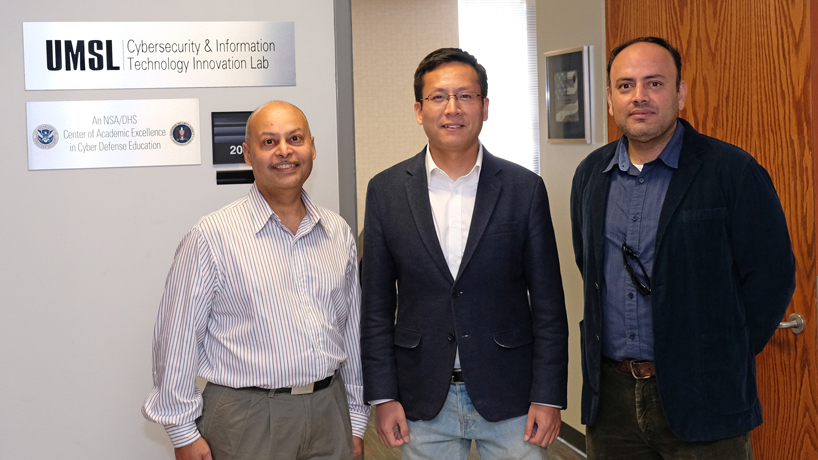
Sanjiv Bhatia, professor and graduate director of computer science, Jianli Pan, assistant professor of computer science, and Shaji Khan, assistant professor of information systems, served as the investigators for a $294,519 grant from the National Security Agency. Pan also acquired an additional $199,131 NSA grant for UMSL’s cybersecurity program. (Photo by August Jennewein)
The University of Missouri–St. Louis cybersecurity program has landed two grants totaling $493,650 from the National Security Agency to address evolving security topics and develop innovative infrastructures.
One of the grants, for $294,519, will be used to purchase equipment for UMSL’s cybersecurity laboratory in Express Scripts Hall and to develop flexible, multipurpose labs that foster hands-on skills and development through a private, open-source cloud.
Existing cybersecurity lab infrastructures require considerable maintenance and have limited opportunities for students to learn beyond the instructor-designed tasks. The grant funds will address these restrictions by allowing students to build their own lab setups at will in a completely self-service fashion, providing a wide range of possibilities and the opportunity to interact with the entire security lifecycle of IT infrastructure and applications.
“We flipped the traditional lab model on its head,” said Shaji Khan, assistant professor of information systems, who served as a grant investigator alongside computer science professors Sanjiv Bhatia and Jianli Pan. “We have not seen this type of environment elsewhere.”
The new lab infrastructure, which is on track to be available in early 2018, will also engage students through ethical hacking activities in a sand-boxed environment that is both flexible and scalable.
The second grant, for $199,131, will provide students access to research and an education testbed on securing Internet of Things systems. Through in-depth and carefully crafted course modules, students will be able to acquire new knowledge, skills and abilities.
Pan, who served as the primary investigator for the proposal, said the enhanced curricula will adopt active learning approaches and center around student success.
“UMSL students will be better educated and prepared to join in the future cybersecurity workforce and get access to more federal government cybersecurity positions,” Pan said.
The new modules, materials and infrastructures created as a result of both grants will be easily replicable for broad adoption at other institutions and within the field at large.
“UMSL’s vision is that as the number of schools incorporating these flexible approaches grows, the academic community can benefit by sharing of curricula, virtual machine images and lab exercises related to cybersecurity education,” said Dinesh Mirchandani, chair of the Department of Information Systems.
UMSL offers undergraduate and graduate certificates as well as an undergraduate minor in cybersecurity. The program is marked as a National Center of Academic Excellence in Cyber Defense Education (CAE-CDE), a designation granted by the NSA and U.S. Department of Homeland Security.
The goal of the designation is to strengthen the national information infrastructure by producing cyberdefense professionals and promoting higher education and research. UMSL holds the only four-year CAE-CDE designation in Missouri.
“We have rapidly expanded and modernized our computer science and information systems offerings over the past few years, and this trend will continue,” said Cezary Janikow, chair of the Department of Math and Computer Science. “Cybersecurity is a vital part of this expansion, both as certificate education and also as supplement and improvement to other of our existing curricula.”














